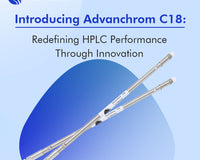Knowledge Base
-

The Critical Role of Chiral Separation and Its Modern Solutions
Chirality can mean the difference between medicine and catastrophe. In this article, we summarize the necessity of enantiomeric precision and explain how our Blossmate chiral columns offer flexible, MS-compatible solutions for analytical and preparative workflows, with chromatograms comparing our and competitor's column performances. -

Advancing Metabolic Therapeutics: An Overview of Retatrutide and the Analytical Rigor of Peptide Quantification
Retatrutide is a new synthetic peptide that facilitates weight loss through a dual-action mechanism. In this article, we utilize an Ultisil LP-C18 column for the determination of Retatrutide that achieves baseline separation with high resolution records. -
![[Readers Insight] How to Analyze Fragment Ions in Mass Spectrometry?](//www.welch-us.com/cdn/shop/articles/frag-ion-120-1080_1228c077-5251-447a-ac74-840589c19bce_535x.jpg?v=1768889415)
[Readers Insight] How to Analyze Fragment Ions in Mass Spectrometry?
In this article, we investigate the fundamental mechanisms of ion fragmentation within mass spectrometry workflows and explore why systematically mapping fragment-ion structures is essential for deeper mass-spectrometric interpretation. It explores the relationship between electronic displacement and dissociation pathways, emphasizing structural reconstruction over simple pattern recognition. -
![[Readers Insight] Asking the Questions Right: A Guide to Troubleshooting Consultations in HPLC Method Development](//www.welch-us.com/cdn/shop/articles/asking-115-1080_e1af459a-8c94-4cee-a7ea-1d8f32e355df_535x.jpg?v=1768532002)
[Readers Insight] Asking the Questions Right: A Guide to Troubleshooting Consultations in HPLC Method Development
Mastering HPLC method development requires more than technical skill; it demands effective communication. This guide explores how junior scientists can overcome "question anxiety" by utilizing precise data packages and structured inquiries. Learn to transform troubleshooting consultations into professional growth opportunities, ensuring faster resolutions and building lasting laboratory expertise. -
![[Readers Insight] The Interplay between Column Properties and Peak Integration](//www.welch-us.com/cdn/shop/articles/integration-1080-121_6a48d9b6-1313-4763-bd30-92e8074b75f8_535x.jpg?v=1768447339)
[Readers Insight] The Interplay between Column Properties and Peak Integration
In HPLC, the relationship between physical separation hardware and mathematical data processing is often overlooked. This article explores the inconspicuous but critical connection between column properties and the fidelity of peak area calculation, examining why theoretical constancy in integration often fails to align with empirical laboratory observations. -
![[Readers Insight] Gradient vs. Isocratic Elution: Which to Choose?](//www.welch-us.com/cdn/shop/articles/gradient-1080-105_535x.jpg?v=1767749867)
[Readers Insight] Gradient vs. Isocratic Elution: Which to Choose?
In this article, the author evaluates isocratic and gradient elution strategies in HPLC method development, providing expert guidance on selecting elution modes for pharmaceutical assays, impurity profiling, and complex separations. -

LP Columns: More Than Just Tolerating Strong Acids
Ultisil LP columns from Welch Materials are designed for low-pH chromatographic conditions, yet their advantages are more than simply resistance to strong acids. Read this article to learn how these columns outperform in a unique way. -

High-Resolution SEC-HPLC Aggregation Analysis of a Pembrolizumab Biosimilar Using Welch Xtimate™ SEC Columns
This application note presents a robust SEC-HPLC method for high-resolution aggregation analysis of a Pembrolizumab biosimilar using Welch Xtimate™ SEC-300 columns. The method demonstrates excellent separation of monomer, HMW aggregates, and LMW fragments, supporting routine QC and biosimilar comparability studies. -
![[Readers Insight] Hydrophilic Interaction Chromatography (HILIC): A Nemesis to Polar Compounds](//www.welch-us.com/cdn/shop/articles/1080_a134ed46-3aa6-4c67-878d-1c3786a088e9_535x.jpg?v=1767751595)
[Readers Insight] Hydrophilic Interaction Chromatography (HILIC): A Nemesis to Polar Compounds
Polar compounds that refuse to stay on C18 columns can be frustrating. HILIC chromatography provides a versatile solution through partitioning and interaction mechanisms. In this post, we break down HILIC principles, column types, mobile phase strategies, and key method development tips to help you achieve reliable retention and separation. -

The Flow Cell in HPLC: A Small Component with Big Consequences
In LC analysis, column, mobile phase, and gradient are what we pay most attention to. However, sometimes the difference in flow cells can lead to significantly different results. This article explains the details behind it. -
![[Readers Insight] Triethylamine as a Mobile Phase Additive: What Does It Do?](//www.welch-us.com/cdn/shop/articles/triethylamine-1080-1215_c5628b48-1386-4303-9888-40c9ff3ebe24_535x.jpg?v=1767518636)
[Readers Insight] Triethylamine as a Mobile Phase Additive: What Does It Do?
In this article, the author explains the uses of triethylamine as a mobile phase additive in HPLC, with real-world examples from pharmacopoeias and literatural applications. -
![[Readers Insight] Why is Formic Acid Added to the Mobile Phase in Mass Spectrometry?](//www.welch-us.com/cdn/shop/articles/formic-acid-1080_285b53f7-6c39-44e1-98eb-566f7e73016d_535x.jpg?v=1765503777)
[Readers Insight] Why is Formic Acid Added to the Mobile Phase in Mass Spectrometry?
Formic acid is commonly seen added to the mobile phase in mass spectrometry methods, but have you wondered what specific role it plays, and can other acids substitute it? This article explains the role of formic acid in MS from the perspective of chemical reaction equilibrium thoroughly.








![[Readers Insight] How to Analyze Fragment Ions in Mass Spectrometry?](http://www.welch-us.com/cdn/shop/articles/frag-ion-120-1080_1228c077-5251-447a-ac74-840589c19bce_535x.jpg?v=1768889415)
![[Readers Insight] Asking the Questions Right: A Guide to Troubleshooting Consultations in HPLC Method Development](http://www.welch-us.com/cdn/shop/articles/asking-115-1080_e1af459a-8c94-4cee-a7ea-1d8f32e355df_535x.jpg?v=1768532002)
![[Readers Insight] The Interplay between Column Properties and Peak Integration](http://www.welch-us.com/cdn/shop/articles/integration-1080-121_6a48d9b6-1313-4763-bd30-92e8074b75f8_535x.jpg?v=1768447339)
![[Readers Insight] Gradient vs. Isocratic Elution: Which to Choose?](http://www.welch-us.com/cdn/shop/articles/gradient-1080-105_535x.jpg?v=1767749867)


![[Readers Insight] Hydrophilic Interaction Chromatography (HILIC): A Nemesis to Polar Compounds](http://www.welch-us.com/cdn/shop/articles/1080_a134ed46-3aa6-4c67-878d-1c3786a088e9_535x.jpg?v=1767751595)

![[Readers Insight] Triethylamine as a Mobile Phase Additive: What Does It Do?](http://www.welch-us.com/cdn/shop/articles/triethylamine-1080-1215_c5628b48-1386-4303-9888-40c9ff3ebe24_535x.jpg?v=1767518636)
![[Readers Insight] Why is Formic Acid Added to the Mobile Phase in Mass Spectrometry?](http://www.welch-us.com/cdn/shop/articles/formic-acid-1080_285b53f7-6c39-44e1-98eb-566f7e73016d_535x.jpg?v=1765503777)